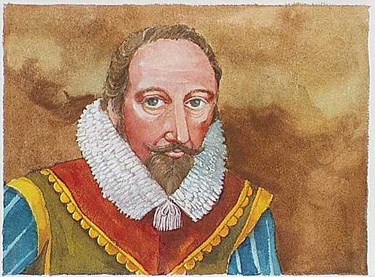
NPS image
Between the years 1000 and 1500, Europe experienced many changes that shaped the future of the world. From 1096 until 1296, West met East during the escapades collectively known as the Crusades. While fighting to liberate the Holy Lands from the Moslem Turks, Europeans were exposed to and garnered an appetite for many Eastern products that were either previously unknown or were cost prohibitive. Those items included spices, drugs, silk and china. Many of these items gained further notoriety from Marco Polo's writing. Having spent almost his entire lifetime experiencing the cultures of Cathay (China) and Cipango (Japan), Polo wrote glowing accounts of his experiences. The invention of the printing press and the development of books spurred many people's curiosity about foreign lands. As the Renaissance opened the fifteenth century, technological advances allowed for worldwide exploration. New items included the portalani or navigational maps, the astrolabe, which allowed a person to discern latitude, and the magnetic compass. From the days of discovering the riches of the Orient, the Europeans endeavored to acquire better routes for trade - preferably an all water route. The land routes had been long, hard and expensive, considering the bribes that had to be paid along the way. By 1488, Bartholomieu Diaz improved the prospect of an all water route when he rounded the Southern tip of Africa (Cape of Good Hope). Ten years later, his fellow Portuguese countryman Vasco da Gama actualized the quest when he sailed all the way to Calcutta, India. In the meantime, Europeans completed other explorations, including Christopher Columbus's historic journey to the New World on behalf of Ferdinand and Isabella. In the following years, Spain and France began to look towards North America. However, neither country was very interested in colonization. In the interest of strengthening their respective states, these nations concentrated on reaping the natural resources of the newly discovered land. England was last of the major three powers to become involved in obtaining new lands. Unlike Spain and France, England saw advantages to colonization. Colonies would offer a depository for the overflow population and provide new sources of raw materials. Colonies would also provide a natural market for the mother country, since the colonists would want to purchase quality-made goods from the homeland. England's claim to North America was exacted in 1497 and 1498 by the two voyages of the Cabots. The father and son team explored the area from Newfoundland to possibly the Chesapeake Bay region prior to claiming it for Henry VII and England. Almost 80 years passed before England began its attempts to colonize North America. Sir Humphrey Gilbert obtained the patent (royal permit to come to the New World) from Elizabeth I in 1578. He sailed towards the New Land but was sidetracked by chasing the Spanish. His attempt at colonization had to wait until 1583, when he tried to establish a settlement in Newfoundland. This attempt failed, and it cost Gilbert his life. Now the royal patent went to his half brother, Sir Walter Raleigh. Raleigh, who never set foot in North America himself, funded two expeditions that ended in failure. The more famous of these was the "Lost Colony of Roanoke" in the Outer Banks of North Carolina. King James I was interested in colonization, and he provided for the creation of joint stock companies as a means of funding the expeditions. The Plymouth Company tried to establish a colony on the Kennebec River in Maine in late 1607. But, after the death of their leader, George Popham, and their freezing out, the people decided to return to England and the attempt at colonization was a failure by February of 1608. Finally, though, 105 men and boys plus 39 sailors left London, England on December 20, 1606. After a difficult journey across the Atlantic Ocean, the group arrived at the Virginia Capes on April 26, 1607. After planting a cross on the 29th, Christopher Newport and a small group explored the area, seeking a defensive location for the establishment of their new settlement. As different European countries established colonies in the New World, they were forced to interact with each other in new ways. Each country was primarily concerned with its own national and imperial development. As a result, commercial and religious rivalries developed between the competing colonial powers. These interactions between colonial powers in the 600 year period prior to the settlement of Jamestown affected the development of the permanent European colonies that were ultimately established in America.
BIBLIOGRAPHY Garraty, J. The National Experience. New York: Harcourt, Brace, Johanvich, 1981. Morris, Richard. Encyclopedia of American History. New York: Harper and Row, 1985. Morrison, Samuel E. The Great Explorers. New York: Oxford Press, 1978.
|
Last updated: February 26, 2015
